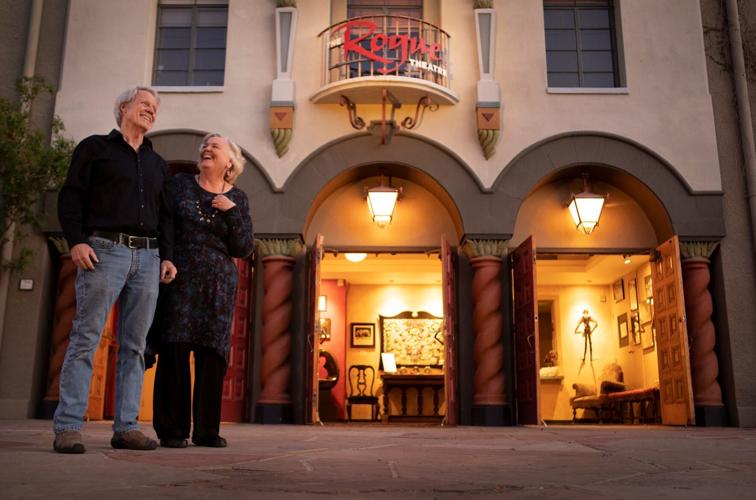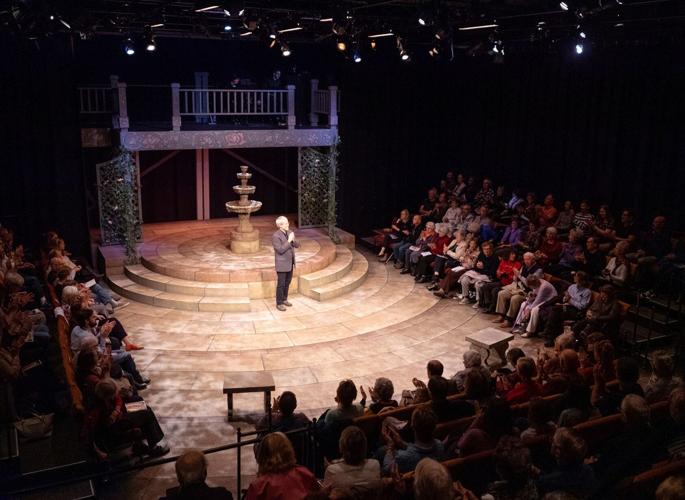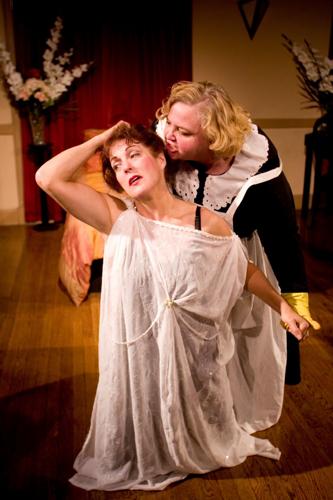Cynthia Meier and Joe McGrath had a very clear vision when they launched Rogue Theatre in 2005: To stage works that were being overlooked in Tucson’s theater space.
They wanted to bring great literature and classic works to life, but there weren’t a lot of opportunities in Tucson’s theater community to “climb the big mountains,” McGrath said.
“So we decided to start staging great plays and great literature and see if there was an audience out here for that,” he said recently as he and Meier were in the midst of rehearsing the first production of their 20th anniversary season. “It turns out that there is given the fact that we’re still cruising around here 20 years down the road.”
Rogue Theatre opens its 20th season on Friday, Sept. 6, with one of those great works, Thornton Wilder’s Pulitzer Prize-winning play “The Skin of Our Teeth.” Performances at its theater, 300 E. University Blvd. in downtown’s Historic Y, run through Sept. 29.
The season includes five plays through next spring, when they will present Shakespeare’s “Romeo and Juliet.”
In its infancy, Rogue Theatre was an itinerant company with no place to call home. They split their time at Zuzi Dance Theatre when it was at the Historic Y and the Temple of Music & Art’s 60-seat Cabaret Theatre. In 2006, they did Wallace Shawn’s “The Fever” at Hotel Congress.
“For four years, we were moving around, but… we eventually found out that audiences, when you say you are with the Rogue Theatre, the very first thing they ask is where is that,” McGrath said. “If you don’t have a home, you can’t place yourself in the audience’s mind and build an audience of any size and consistency.”
In their fourth season, the company moved into the 160-seat space that was home in the 1950s to the late Mary MacMurtrie’s Tucson Children’s Theatre.
“Almost immediately, they kind of rose to the top especially after they got their own space,” said Kathleen Allen, the longtime Arizona Daily Star theater critic who continues to do reviews in retirement. “They became one of the top theaters in Tucson.”
Every year, the company staged a work by Shakespeare — in theater, all roads lead back to the Bard — and mounted plays by great American playwrights from Eugene O’Neill to Tennessee Williams, Arthur Miller and George Bernard Shaw.
They also wanted to bring great literature to life on their stage with play adaptations of novels.
“Not only are we talking about wanting to do really great literature in terms of dramatic literature but also in terms of prose, of writers we feel deserve to be heard,” said Meier, who did her first adaption in their inaugural 2005-06 season of James Joyce’s short story “The Dead.” “Great literature shouldn’t just be read but should be heard and lived.”
To date, the Rogue has commissioned or done the first performances of 14 adaptations. In November, they will do their 15th, John Capecci’s adaptation of Italo Calvino’s novel “If on a winter’s night a traveler;” Capecci will be in Tucson to lead a free discussion of the play on Oct. 26.
Their 20th anniversary season also includes John Millington Synge’s “The Playboy of the Western World” Jan. 10-Feb. 2, 2025; and Jordan Harrison’s “Marjorie Prime,” Feb. 21-March 16.
Meier said the company has kept an ensemble of a dozen actors who get three roles a season. She and McGrath also act and direct.
Allen said one of the things that also sets Rogue Theatre apart from other companies in Tucson is its large-cast productions, made possible by a loyal funding base of dedicated followers.
“They do really challenging work that none of the other theaters did including (Arizona Theatre Company),” she said. “Sometimes it falls flat on its face, but you can’t fault a theater for falling flat on its face for doing something courageous. And I think the Rogue is always doings something courageous.”
Texas A&M University has been chosen as the Texas host for Shakespeare’s First Folio on its national tour to commemorate the 400th year anniversary of Shakespeare’s death and as part of that celebration,Cushing Library offered a hands-on introduction to the history of books and printing. Participants of all ages had the opportunity to set type, learn to make and marble paper, and print an opening from the First Folio of William Shakespeare using an authentic English common press.






